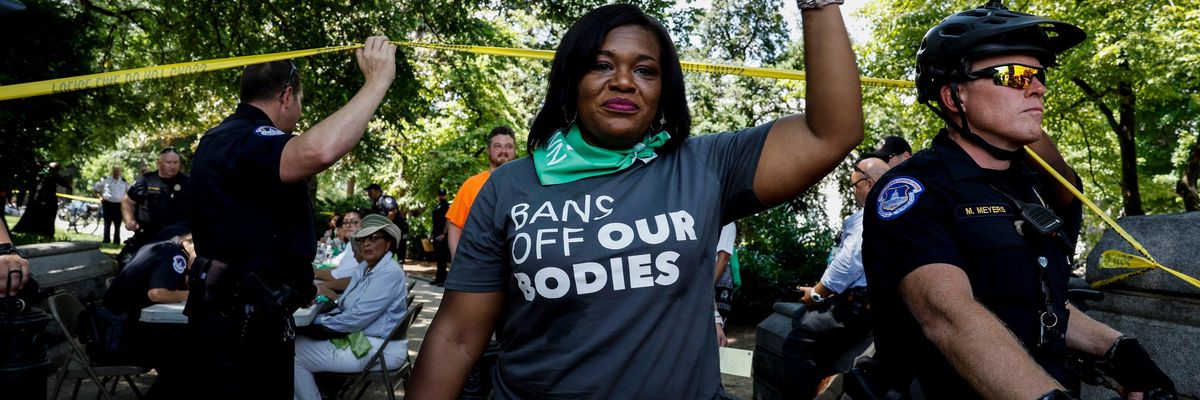As thousands of people gathered at pro-choice rallies across the United States, multiple congresswomen marked the 50th anniversary of Roe v. Wade on Sunday by sharing their own experiences with abortion care and renewing calls to protect reproductive rights in the wake of the U.S. Supreme Court reversing its landmark ruling.
"I'm one of the 1 in 4 women in America who has had an abortion. Terminating my pregnancy was not an easy choice, but more importantly, it was MY choice," tweeted Rep. Pramila Jayapal (D-Wash.), chair of the Congressional Progressive Caucus, who has previously shared her story in a New York Times opinion piece and during a House hearing.
"Everyone's story is different, but I know this for certain: The choice to have an abortion belongs to pregnant people, not the government. We are not free if we cannot make these fundamental choices about our bodies," she continued. "MAGA Republicans' extreme abortion bans aren't about saving lives, they're about control. We must stand up and fight these bans. Together."
Fellow Washington state Democrat Rep. Marie Gluesenkamp Pérez, who was sworn in for her first term earlier this month, wrote on Twitter: "Three years ago I miscarried in the second trimester of a pregnancy. It's a painful memory but something many women have experienced. I traveled hours to the nearest clinic, and I encountered anti-choice protesters. Thankfully I got the care I needed that day."
"I had been told without an immediate abortion, or dilation and evacuation, that my life was at risk. That I could die, or not be able to have children in the future. I got the care I needed, and now I'm the mother of my 17-month-old son," she said. "On what would've been Roe v. Wade's 50th anniversary, I'm thinking of the millions of Americans with stories like mine who are forced to go without access to safe reproductive care. I won't stop fighting to restore this fundamental right and defend reproductive freedom for all."
Nearly seven months since the high court's right-wing majority overturned Roe with Dobbs v. Jackson Women's Health Organization, "abortion is currently unavailable in 14 states, and courts have temporarily blocked enforcement of bans in eight others," according to a December review by the pro-choice Guttmacher Institute, which tracks state laws.
Just after the Dobbs decision leaked last May, Elle published a roundtable discussion with the only five then-members of Congress who had publicly shared abortion stories: Jayapal; Sen. Gary Peters, whose ex-wife got a potentially lifesaving emergency abortion in the 1980s; and Reps. Cori Bush (D-Mo.), Barbara Lee (D-Calif.), and Jackie Speier (D-Calif.), who did not seek reelection last year.
In the weeks that followed, Reps. Gwen Moore (D-Wis.) and Marie Newman (D-Ill.)—who lost her June primary after redistricting—also detailed their abortions when they were each 19 years old. During a House hearing, Rep. Lucy McBath (D-Ga.) shared that "when my doctor finally induced me, I faced the pain of labor without hope for a living child."
"Would it have been after the first miscarriage, after doctors used what would be an illegal drug to abort the lost fetus?" McBath asked. "Would you have put me in jail after the second miscarriage?"
McBath took to Twitter Sunday to highlight that testimony and warn that "without Roe, all reproductive care is on the line."
Bush—who has spoken about seeking an abortion after becoming pregnant as a result of rape at 17—said in a statement Sunday that "the Roe v. Wade decision was not only historic in that it protected people accessing abortions; it also served as precedent for several more court cases and laws to follow that would further advance gender equality, reproductive rights, and our collective freedoms."
"Unfortunately, we all know what happened last June. Republicans spent decades stacking the federal judiciary with far-right anti-abortion judges and successfully stripped millions of people of their right to safe, legal, and accessible abortion care, particularly Black, Brown, LGBTQ+, and other marginalized communities," she said. "And, let's be clear, Republicans aren't stopping with Roe."
"In just their first couple of days in power, House Republicans passed two anti-abortion bills in a blatant attempt to lay the groundwork for a national abortion ban," added Bush, who was among the 17 federal lawmakers arrested in July while protesting Dobbs at the Supreme Court. "As a congresswoman, a mother, a pastor, and as a person who has had abortions, I will never stop fighting for a person's bodily autonomy, reproductive rights, and for a country that lives up to its proclamation of freedom."
Moore—who represents a state where abortion is now unavailable due to a contested 1849 ban—issued a similar warning in a series of tweets, declaring that "this Roe anniversary is a reminder of what we've lost, and we must fight for a future that creates more equitable healthcare access for all."
"The chaos we've seen over the past six months is the environment anti-abortion politicians have worked for decades to create, and they won't stop with Roe. While we work to protect and restore access to abortion, more attacks on sexual and reproductive health are happening now," she said. "The path ahead will be challenging. It will require us to think bolder than ever before to ensure our very basic rights and freedoms are permanently protected—not subject to whoever happens to be in power."




